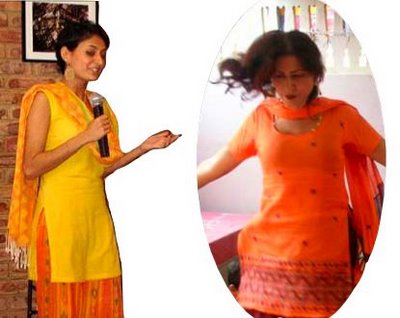 Among the post-event post-Q&A discussions that followed within small groups (and the place was buzzing) there was one recurring thought: Given the scale, number, and variety of problems developing countries face, it was a wild fantasy for Bindiya or her supporters to imagine that the difficulties encountered by such a small subset of the population would even be on the radar of the governments of any of the countries in the majority world (to use Shahidul Alam's term of choice). Some felt that the vote-bank was not large enough for any politician to try and woo. Others, that any decent politician (yes, it is possible, though admittedly rare) who truly wished to support such a cause would be mocked so much that he would lose his general credibility.
Among the post-event post-Q&A discussions that followed within small groups (and the place was buzzing) there was one recurring thought: Given the scale, number, and variety of problems developing countries face, it was a wild fantasy for Bindiya or her supporters to imagine that the difficulties encountered by such a small subset of the population would even be on the radar of the governments of any of the countries in the majority world (to use Shahidul Alam's term of choice). Some felt that the vote-bank was not large enough for any politician to try and woo. Others, that any decent politician (yes, it is possible, though admittedly rare) who truly wished to support such a cause would be mocked so much that he would lose his general credibility.It was a joy, then, to see this news item from our 'neighbouring country' (a euphemism that our state media uses for India, lest the invocation of the actual name result in that evil genie materialising and devouring us).
DISCRIMINATED AGAINST and forced to live in secluded communities, India’s hijras have always had to fight for basic entitlements. Two weeks ago, however, a major victory was achieved when Tamil Nadu added a third gender to ration cards. Hijras may now enter a ‘T’ (for transgender) in place of a ‘M’ or ‘F’ on ration cards. The move makes Tamil Nadu the first Indian state to officially recognise its hijra citizens.Incidentally, the article is by Morgan Harrington, who was at Hampshire College with our daughter. Read the whole story
They should not be treated as less than human, I agree.
ReplyDeleteI must admit, though, to feeling distinctly uncomfortable when some of them come asking for money.
@sidhusaaheb: On my visits to Karachi, I sometimes encounter a feeling that my interlocutor is distinctly uncomfortable at our meeting (and I don't think it is always that my zipper is alas, and purposelessly, down). It could be, probably is, that my name sounds so un-local, and there has been such a recent history of decrying un-local persons, that the feeling becomes more normal than happens in other, more cosmopolitan, I dare say, cities, or cities in more cosmopolitan countries.
ReplyDeleteSimilarly, the discomfort on being pestered for alms by a hijra, is 'learned' rather than 'encoded'.
Is it any worse than the discomfort felt when someone terribly disfigured or mutilated comes close to beg?
Life is a constant learning, and some things are harder to learn (or rather, to unlearn), but no less vital.
Zakintosh, you wish is being granted. The first faltering steps can be seen here:
ReplyDeletehttp://www.youtube.com/watch?v=5b4_NkS26Go